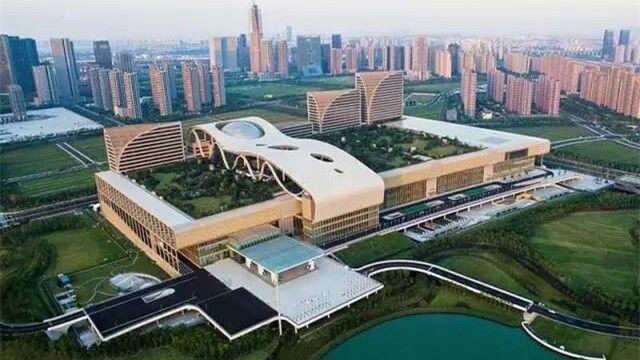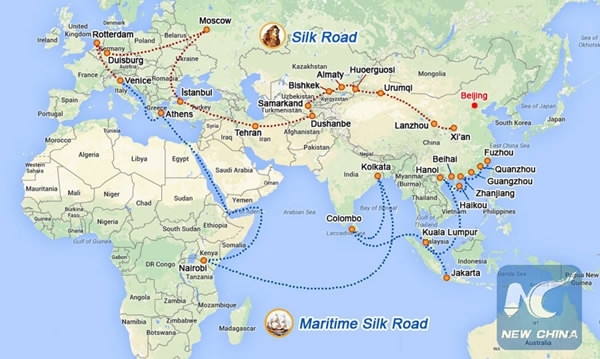
Politics
19:35, 02-Nov-2017
Specific policies from Xi Jinping's theory
By Yang Yutong

Talking about foreign policy, Xi Jinping, General Secretary of the Communist Party of China (CPC) Central Committee, envisions an international community with a shared future or common destiny, win-win cooperation, and mutual development.
What are some specific examples of that policy, and specific policies that emerged from his theories? Su Ge, president of China Institute of International Studies (CIIS), shared his ideas with our host Robert Lawrence Kuhn.
Su notified: "When you have a general theory or vision, a vision of seeing the world’s people as living in one community with a shared future, with a shared destiny, you can find linkages in many areas."
"Normally people would say that in economic cooperation, you can find this linkage. In the international community, if we join hands, we make the economic pie much larger. This is just the right way, and also the situation in which we find that we are all part of a community with a shared nature," Su added.

Picture shows the Silk Road Economic Belt and the 21st Century Maritime Silk Road, collectively known as the Belt and Road initiative. /Xinhua Photo
Picture shows the Silk Road Economic Belt and the 21st Century Maritime Silk Road, collectively known as the Belt and Road initiative. /Xinhua Photo
Su gave an example of the Belt and Road Initiative. "Along this road, it’s no longer a zero-sum game. People could all benefit. Investors, whether you are from a developing country, whether you are from the West, if you make investments, you will certainly have your returns."
China’s experience is applicable to other countries
From the start, China has said Chinese system can be applied to the rest of the world. Robert Lawrence Kuhn sought the insights of Zhang Sujun, vice president of China Law Society.
"China’s experience in exploring the mode of development is based on China’s realities and proved to be successful. This mode of development helps millions of people shake off poverty and leads billions more on a path to a moderately prosperous society, which is unprecedented in the world," said Zhang.
Zhang pointed out, "China’s successful experiences, to some extent, provide a new model for other developing countries to realize modernization. They can learn from China’s model, especially in the aspect of the rule of law."
"The rule of law should suit economic realities, histories, and cultures, and combine with the rule of virtues, serving as the foundation of the governance of China. Although the model of development cannot be fully copied, other developing countries can learn from China’s experiences based on their national realities," Zhang added.
China faces new challenges in 'new era'
General Secretary Xi Jinping emphasized a "new era" in socialism with Chinese characteristics mainly due to the tremendous development China has achieved over the years.
Development has also brought with it a new way of thinking about contradictions in society. The biggest contradiction is unbalanced and inadequate development in relation to people’s needs.
Our host Robert Lawrence Kuhn asked Xie Chuntao, alternate member of the CPC Central Committee, how government’s problems relate to the overarching way of thinking in terms of contradictions in society.
“The CPC faces a lot of challenges today. The report at the 19th National Congress has covered such challenges. It includes how Party-building still faces a lot of problems despite achieving progress."
Xie pointed out the report, in particular, emphasized three tough tasks to accomplish.

Beijing Sanlitun, a prosperous shopping area. /VCG Photo
Beijing Sanlitun, a prosperous shopping area. /VCG Photo
"First, preventing and eliminating risks, like financial risks. If the financial system goes wrong, the whole economic system follows, although China has done quite well in financial development over the past years, with no financial crisis as in Western countries. But that doesn’t mean we don’t face any risks."
"The second is precision poverty alleviation, which over the years has achieved quite positive effects. Tens of millions have been lifted out of poverty. However, there are still those who haven’t, and those who still live in harsh conditions even if they are no longer poor by today’s standards. There are still higher standards that we can exert more effort to attain," Xie said, "In my view, this task is still very challenging for the CPC."
“The third is the improvement of the environment. Over the last five years, the Party and the general public have realized the extreme importance of a sound environment and made a lot of effort for improvement, marking prominent changes compared with the past. However, conditions in many places are far from satisfactory. Beijing is part of that. So, more efforts are needed. In particular, we have the dual task of protecting the environment and developing production at the same time. General Secretary Xi has covered many issues in his report. The three I just mentioned are worth emphasizing,” Xie concluded.

SITEMAP
Copyright © 2018 CGTN. Beijing ICP prepared NO.16065310-3
Copyright © 2018 CGTN. Beijing ICP prepared NO.16065310-3